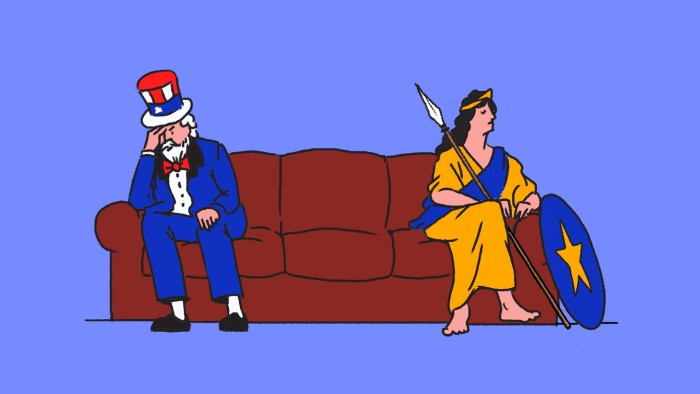Unlock the White House Watch newsletter for free
Your guide to what the 2024 US election means for Washington and the world
You’d been growing apart for years. You knew the break-up was coming, even if you kidded yourself it wasn’t. Now your partner of 80 years is leaving you.
Europe and the US probably won’t remarry after Donald Trump’s presidency, though they may become friends. How can Europe get through the divorce, and rebuild a life?
The first job is to distinguish short-term issues of the break-up from longer-term ones. The short-term fallout will go away when Trump does. These include his designs on Greenland, and his support for far-right European parties — policies that he originated, and that future US presidents are unlikely to follow. On uniquely Trumpian issues, Europeans need to rebuff Trump for less than four years. (He may want to stay on after 2028, given his stated disrespect for election results and the rule of law, but he probably couldn’t, partly because the US has relatively strong checks and balances, and partly because he’ll be 82 then.) This means that Europe’s advantage, in the face off with Trump, is time.
Europeans shouldn’t overestimate Trump as a transactional man with a plan, even if that’s the belief of his supporters, as well as some opponents who warn of a “strongman playbook” to turn the US into an authoritarian state. More than a professional dealmaker, he is a professional entertainer, good at grabbing attention. He announces policies that he hasn’t thought through, then withdraws them when they collide with reality. He suspended tariffs on Canada and Mexico, possibly because they tanked the stock market. US officials said he didn’t really mean that American troops would annex Gaza. Short-term, he’s a manageable adversary.
Longer-term, though, some Trumpian beliefs will probably remain American evergreens — above all, aggressive trade policies and distancing from Nato. This is where Europe needs a new life plan.
The EU has to weaponise its greatest strength: the single market and its regulators. The European Commission is the institution on earth best placed to take on US tech. It now also has an economic “anti-coercion instrument”, known in Brussels as “the bazooka”, to fight trade wars.
The EU wishes it had a serious tech industry and trillion-dollar companies, but there are upsides to not having them. As economist Joseph Stiglitz argues, trillion-dollar companies tend to be the consequences of monopoly. Without tech oligarchs of its own, the EU can confront the industry. That’s a big bargaining chip, as Trump’s chief constituency now appears to be Silicon Valley, not his voters who rendered themselves irrelevant when they elected him one final time.
A skilled divorcee grabs their ex’s best assets. Europe should encourage an American brain drain under Trump. He is hostile to climate science and is defunding medical research. Red states have censored teaching on race and sex at their public universities. Trump may further damage US universities by denying visas to students and scholars. European universities, which increasingly teach in English, could benefit.
The hardest issue for Europeans will be defence. Europe isn’t a military alliance. Several European governments and major parties are pro-Russian. Yet the US’s support for Ukraine is less essential than often imagined. The US allocated nearly $183bn to Ukraine from February 2022 to September 2024. That works out at about $69bn a year. Nato’s 637 million non-American citizens could replace this at a cost of $108 a year each — about 0.25 per cent of the EU’s per capita GDP. It’s doable.
The deeper problem is that westerners aren’t willing to die for Ukraine. That means Europeans won’t serve as a peacekeeping force on a future Russian-Ukrainian border, providing security guarantees for Ukraine. Europeans won’t risk getting sucked into a war if Russia kills a few of their soldiers. But then, the mighty American military won’t fight either, under any president. Since George W Bush’s disastrous invasions, no administration has entered a war. In other words, if Russia attacked the Baltics, Nato might fight for months at most. Western European and American military reluctance is an existential threat to eastern Europe.
Nato is still worth something, and Europeans need to keep it alive, along with other international institutions threatened by Trump: the Paris climate accords, the World Health Organization, the IMF, World Bank and International Criminal Court. American absence could allow Europeans to reshape some institutions in their own interests.
Divorce sucks, but with ingenuity you can sometimes restart from a better place.
Email Simon at [email protected]
Find out about our latest stories first — follow FT Weekend Magazine on X and FT Weekend on Instagram














